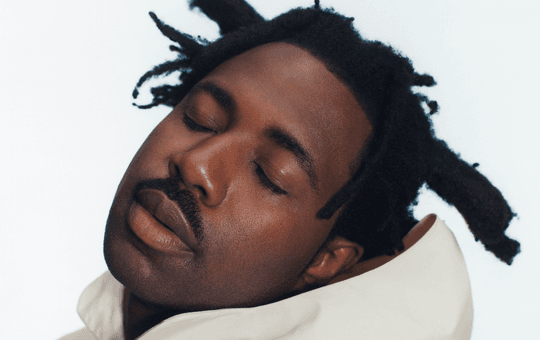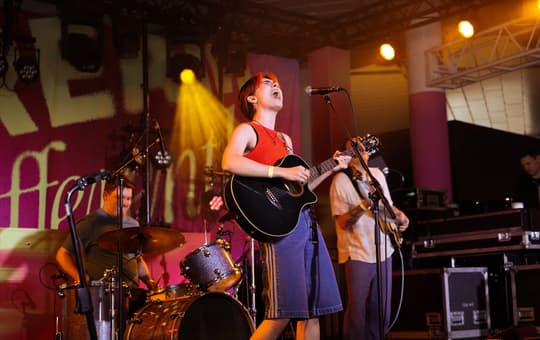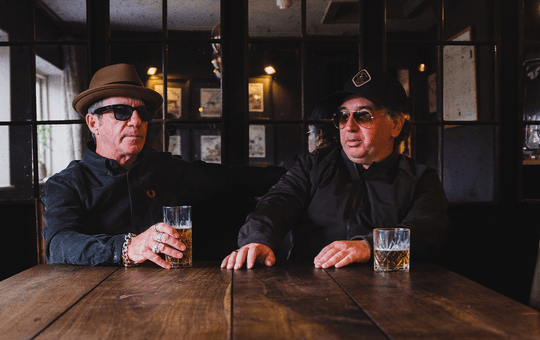Quick catchup: Battles
The loss of a founding member, and one as central as a lead vocalist, could be expected to prove a turning point for any band. Returning this summer with their second album, ‘Gloss Drop’ on Warp Records – their first since the departure of Tyondai Braxton – New York band Battles have transformed the aggressive, math-rock minutiae of their debut into a looser and arguably freer experience, with the likes of Ice Cream showcasing a tropical funk far away from the suffocating complexity of earlier. I caught up with guitarist Ian Williams about making the record, collaborating with other artists and how important the change in personnel has been to the band’s art.
How’s things? What’s it like to be back on the road, with a new album under your belt?
It feels good to be back and playing again. We’re discovering how to play new songs, so there’s a lot of new territory to explore. So it’s fun. It feels fresh for us right now and there’s a lot of room to grow still.
Obviously circumstances have changed things, but the music on this album does feel fundamentally different in places: John’s beats, for example, have an almost dance edge to them at points. How much do you think you’ve changed since ‘Mirrored’?
Yeah, I think we were going for a different thing. I think we’re still the same band. If you take a look at the EPs, then where we went from there to ‘Mirrored’ was a pretty big change and I think that where we went from ‘Mirrored’ to ‘Gloss Drop’ was a pretty big change. But I genuinely believe that it’s pretty hard to repeat what you did before, at least for us. It’s not like we’re trying to put together the right list of ingredients for what works and then just running with that.
“I don’t think we could have made a second ‘Mirrored’… it wouldn’t have been genuine.” Ian Williams, Battles
I think it’s a little more of an exploration: a kind of fluid, slippery definition of how our songs come together. I think we’ve always thought of ourselves as in situations where we’re not sure if it’s going to work or not. That’s part of the fun of it: putting yourself in those sorts of scenarios where you have to sort of push yourself to find out if it can work. That, to some degree, is the joy of making music. I don’t think we could have made a second ‘Mirrored’… it wouldn’t have been genuine.
Some of the tracks on the album, like Futura, Dominican Fade, are examples of something that perhaps you wouldn’t have been able to do at the time of the first album. You’ve been making music in various bands for many years. Do you still feel like you’re learning something new?
I think you have to keep finding yourself in situations where you’re discovering. I feel that you need to keep trying to surprise yourself. I don’t necessarily know if it would have clicked with us earlier; there was something that actually, for us, this time, was… yeah, it had a certain meaning. On the level that it was surprising… It might not have actually felt surprising to us earlier but at this point it did. I think it really hits you with where you are at each step… what kind of thing will jar you a bit and shake you out of your stupor, something that will actually make you go “Wow, what was that?”. I guess, to some degree, the things on this record are the things that managed to do that for us.
With the changes that have taken place, presumably you had to rethink not just what the band meant to you, but what you meant to the band: what your role was. What were your feelings with regard to having to take on new roles?
We always had a lot of sonic generating potential, each member of the band, and one of the biggest challenges has always been finding ways to create space for everybody, just sonically. I think we always struggled with these fields between cacophony and something that makes sense. To some degree it became a little bit easier to find space for material and that changed things. And I’m sure there’s some sort of mythical, mathematically significant thing going on about three people playing together instead of four. It does sort of create new relationships.
“I’m sure there’s some sort of mythical, mathematically significant thing about three people playing together instead of four.” Ian Williams, Battles
Do you think that the process of putting together this record has been easier or more difficult?
It was a little more succinct. I think groups of three… it’s easier to sense the direction. When you get two versus two, things get a lot more…
It’s easier to reach a consensus within a group of three?
I think so. And you know, maybe that’s a problem. But I don’t know.
On the level of ideas, it makes you more willing to try something if there’s not someone saying, “Let’s not try that.” Perhaps it frees you up a lot more.
Yeah, you know I didn’t think of that. But you’re probably right. There’s one less person to say it’s a bad idea and let’s not try it. It’s always been a band where each member has a pretty distinct sense of music. Finding those rare spots where everyone can come together and agree on something has always been a bit of a challenge. So yeah, to some degree it made it easier to try more things. I guess yeah, there’s definitely less conversation and less thinking. There’s more doing and more, just like, putting stuff out there. It’s so much better to just hear it and not have to describe what a piece of music might sound like if you try a certain idea. Because someone else will challenge the idea and you sit around for six hours and then that’s the end of your band practise. As opposed to just getting some raw material out there.
“There’s definitely less conversation and less thinking. There’s more doing.” Ian Williams, Battles
How much of the album was created new, as opposed to being refined from earlier ideas and demos?
We had some early versions of some of the songs. I think December 2009 we played earlier versions of Ice Cream. But it was all pretty rough at that point and we really thought we’d refine it in the studio. I really think we were trying to use the deadline of the studio as the final tool for writing; something that would make us create finalised versions of things. And we were looking to the studio as a way out from all the endless conversations, as a way of finalising things. Like, you record something and it’s permanent; you can’t dissect it as much, because it’s there. I think we reached a point where sitting down and discussing things… writing things on pieces of paper… there were too many opposing ideas and it was really hard to reach a consensus on a finalised thing that you call a song. I think we were using the studio as an escape mechanism to get past that point.
And of course there was a lot more collaboration on this record, which lends itself to a different approach as well.
It was a little scary to some degree. Opening it up to some outsiders, it became this situation where you were really not in control. That part was kind of scary I think, but at the same time it allowed for some possibilities that were really interesting. I think that, earlier in the band, we would not have been able to imagine working like that.
My Machines (Featuring Gary Numan) by BATTLES
On some tracks the balance between the band and the collaborator is quite interesting. On Sundome, for example, Yamantaka Eye’s vocals are something that are very much his own work: you get the sense that you handed him a very rough idea of what you were after, and in turn he added an element that maybe you couldn’t have find anywhere else.
I think it put us in these new situations which we wouldn’t have been able to be in otherwise. I guess on the other hand it’s still our product, and we still had the power over the ‘Delete’ button if we didn’t like it, so it wasn’t like a live improv show where you get up there with another musician and you’re not sure what they’re going to give you and you have to react in real-time… So it wasn’t fully scary, but it drove you into neighbourhoods that you normally wouldn’t go to and it made us try to orient ourselves in new ways to where we were on the map and figure out our way home from there, with the new situation that we found ourselves in with each performer. It was good, it took us outside ourselves a bit.
“I do think we draw from some of the same sources of inspiration that contemporary techno or dance music draw from: pulsation, repetition, things like that.” Ian Williams, Battles
And lastly, how much do you think the music you’ve been listening to since ‘Mirrored’ has changed things? John has spoken about his recent time in Cologne, meeting people like Michael Mayer, Matias Aguayo (who lent vocals to lead single Ice Cream); do you think you’ve been influenced a lot by stuff you’ve heard while you were writing?
The way that your influences come through on the music, it’s not necessarily stuff on our iPods right now being reflected on the record or anything like that. It’s probably a gradual, subconscious set of background influences that seep into the music and get refiltered gradually. I think the inspiration came from a lot of directions. There are some constants. We do use repetition and that in itself lends a sort of dance music component although I don’t necessarily think we’re influenced by techno music or anything like that. Rather than saying “Oh we heard this producer made a track and we liked it”, I don’t think that was how it worked. I do think in some ways we maybe draw from some of the same sources of inspiration that contemporary techno or dance music draw from: pulsation, repetition, things like that.
Well, congrats on a fantastic new record and enjoy the rest of your summer!
Thanks man.
Warp Records released ‘Gloss Drop’ on 7th June 2011. Battles are currently on tour
August tour dates
12th – Standon Calling Festival, Hertfordshire
13th – Festival la Route du Rock, Saint-Malo, France
14th – Flow Festival, Helsinki, Finland
15th – Strand, Stockholm, Sweden
16th – Bla, Oslo, Norway
17th – Train, Aarhus, Denmark
18th – Pukkelpop, Hasselt, Belgium
19th – Paredes De Coura, Porto, Portugal













